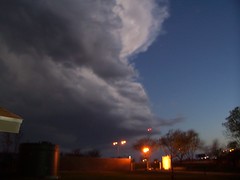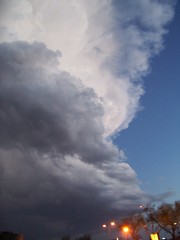I have become hopelessly addicted to RSS.
RSS (really simple syndication) is a special data format (called XML) used to provide an alternate way of reading Web site content. Most blogs have RSS feeds, and the blog you're reading now is no exception:
http://mbrisby.blogspot.com/feeds/posts/defaultRSS feeds aren't really readable on their own, but they're very powerful if used in an RSS reader. You 'subscribe' to a Web site's feed in your RSS reader, and whenever new content appears on that Web site, it shows up in your RSS reader. The advantage of this is that if you follow a large number of sites with feeds, you can see the updated content of all of them in your RSS reader, rather than having to visit all the sites individually: it's one-stop shopping for all your Web-reading needs.
This is a huge help to me, as I need to monitor lots of Web sites which post information about software updates. Without RSS I'd need to spend a significant portion of each day checking all those Web sites individually for updates. But if I subscribe to their feeds, the announcements just show up in my RSS reader.
This is also useful for keeping track of news Web sites (most of which have RSS feeds).
There are lots of different RSS readers, but they all work more-or-less the same way. You subscribe to a list of feeds in the reader, and the reader periodically checks each feed for new content. When a new item shows up in a feed, the reader displays the new item. If it's a new item on a news Web site, for example, you'll typically see the story's title and an excerpt from the story. The title is likely a link, and clicking the title takes you to the full version of that story on the original Web site. Once you're done looking at the new item, you tell the reader to discard it, and the reader doesn't show you that item any more (just new items). However, many readers allow you to somehow save interesting items, so that you can look at them later.
I've tried several RSS readers over the last year or two. First I tried the
Sage Firefox extension. It's pretty cool, but because it's part of your browser configuration, it's only effective on your computer. If you're at a friend's house, even if your friend has Firefox with the Sage extension installed on her computer, her Firefox won't know about your feeds. And even if you subscribe to your feeds on your friend's computer (which may or may not thrill your friend), her computer will display a bunch of items which you've already seen (because her computer doesn't know which ones you've previously read).
The RSS reader in
Thunderbird is OK, but it has the same set of problems as Sage: it's configuration and history are stored locally on your computer. So Sage and Thunderbird are fine, as long as you only read RSS feeds on one computer.
In an effort to learn more about RSS (and
AJAX), I even wrote my own Web-based RSS reader (I wrote it in Perl w/
CGI::Application, and I used
script.aculo.us for the AJAX), and I used that for several months. It ran on my home computer, to which I have a VPN connection from work. So I was able to read my feeds from work or home. While that was a big improvement, it didn't work if I was somewhere other than home or work.
So I recently started using Google Reader, and I think it's a great solution. It's full-featured, in that it lets you categorize your feeds and save items for later (you can 'star' an item), and it's accessible from any computer with an Internet connection. You just point a browser (Firefox, MSIE, whatever) at
http://www.google.com/reader/view/, log in, and start reading.
If you need or want to keep track of a large number of Web sites (as long as they have RSS feeds, which unfortunately not all do), I highly recommend using Google Reader. As of this writing, I am using it to keep tabs on 58 Web sites.



